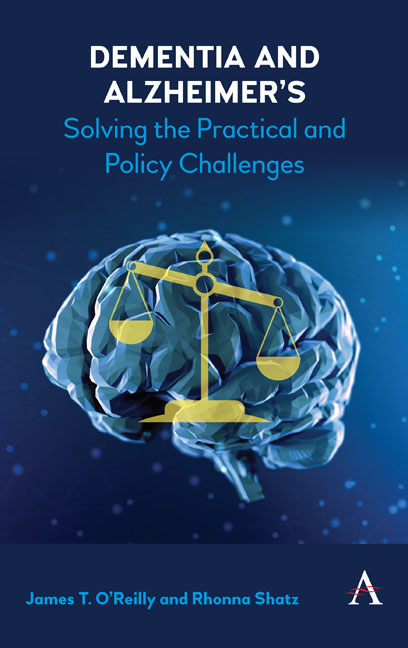Book contents
- Frontmatter
- Contents
- 1 Introduction
- 2 The family dynamics of dementia
- 3 Tort liability related to dementia
- 4 Dementia and private insurance
- 5 Medicare, Medicaid, disability and other government benefits
- 6 Dementia and residential care facilities
- 7 Adult protective services in dementia cases
- 8 Dementia and financial issues
- 9 Dementia in probate and guardianship
- 10 Dementia and employment issues
- 11 Drug research and new product developments for dementia
- 12 Dementia and criminal justice
- 13 Understanding your expert's advice about brain deterioration
- 14 Understanding the causes of Alzheimer's disease
- Appendix: Finding medical reference sources about dementia
- Index
9 - Dementia in probate and guardianship
- Frontmatter
- Contents
- 1 Introduction
- 2 The family dynamics of dementia
- 3 Tort liability related to dementia
- 4 Dementia and private insurance
- 5 Medicare, Medicaid, disability and other government benefits
- 6 Dementia and residential care facilities
- 7 Adult protective services in dementia cases
- 8 Dementia and financial issues
- 9 Dementia in probate and guardianship
- 10 Dementia and employment issues
- 11 Drug research and new product developments for dementia
- 12 Dementia and criminal justice
- 13 Understanding your expert's advice about brain deterioration
- 14 Understanding the causes of Alzheimer's disease
- Appendix: Finding medical reference sources about dementia
- Index
Summary
Practical relations issues for counselors
The law counselor's skill set for dealing with issues of client dementia does not come prepackaged from a law school class or from conventional solo trial practice. Interactive listening skills are essential. Trusting and compassionate manners are vitally important to the attorney's ability to succeed, with difficult interpersonal situations like the intrafamily dementia response struggles that were described in Chapter 2. This requires strength, character and patience. One must evolve positive behavior responses as the situation evolves.
A very experienced elder law specialist has said it best: “The immediate problem facing the attorney is how to assess the limits of a client's capacity and how to communicate effectively with a possibly impaired client. An attorney must be allowed to take practical steps in an effort to solve these concerns.” This has been dubbed “Slow Lawyering” to serve the client who is exhibiting symptoms of dementia.
A team effort is essential to success. Dementia is a tragic loss of personhood by a loved person, and the attorney should work with experienced social workers and nurses to evaluate the best options for the person and those who love her or him. The prudent attorney should not attempt to operate the response to dementia issues as a solo lawyer, and instead she or he will need to draw support from a team of skilled colleagues.
Knowing what questions to ask, and to whom, at the early stage meetings, is a vital skill. A lawyer in the first meeting with the client's family should ask at the outset about the medical or psychological issues with which the client appears to be struggling. What have the medical assessment reports said? How did the patient/client respond to the bad news of their diagnosis? Local chapters of the relevant patient support associations, especially the Alzheimer's Association, may be a starting point for locating a core group of experienced colleagues.
Veteran estate attorneys will advise the younger lawyer as she or he goes through the process for the first time: lower your expectations.
- Type
- Chapter
- Information
- Dementia and Alzheimer'sSolving the Practical and Policy Challenges, pp. 57 - 68Publisher: Anthem PressPrint publication year: 2019



